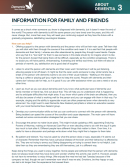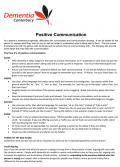Although it's not always easy to cope with disruptive behaviours in people with dementia, there are things that you can do to help with these.
Have a daily routine
Establish a basic daily routine in the household and try to stick to it. Try to keep things as normal as possible and not treat the person with dementia like an invalid. Support them to be independent for as long as possible, doing tasks they can still carry out. This helps them retain some sense of dignity and usefulness.
Because people with dementia experience sundowning, where they get more confused and agitated later in the afternoon, plan to do activities that use more energy, such as bathing, earlier in the day or having the biggest meal at midday.
In the evening, set a quiet mood with lower lights, less noise and soothing music. Also, try to keep the bedroom dark and comfortable to encourage sleeping.
Exercise
You can help the person do simple exercises such as taking one or two walks each day. Physical activity can help use nervous energy and improves mood. Exercise can also make them feel tired so they sleep better at night.
Don't argue
Don't argue or raise your voice when the person you are caring for is distressed or agitated. Instead, try to explain things to them in a calm and reassuring voice. If an explanation doesn't help, you can try distracting them with music, singing, dancing, going for a walk or asking them to help with a simple task such as folding clothes or setting the table.
Offer general reassurance
People with dementia can feel insecure and unsafe at times as they can't remember things and are confused in their environment. They may follow and shadow their carers around wherever they go. They need constant reassurance that they are safe and not alone. As a carer, you can always reassure them that they are safe and let them stay with you if you are doing household chores.
Plan simple activities and social time
Planning simple activities that the person you are caring for has enjoyed or keeping an active social life can help reduce disruptive behaviours.
Attending day programmes in facilities can provide motivation and socialisation for people with dementia while providing respite for you as the carer. It may be difficult to introduce the idea of going to a day programme to a person with dementia as they may not see the need to go and may prefer to remain at home. It can take time for a person with dementia to get used to a new environment and new people.
Ask other people, such as your doctor, family and friends to provide encouragement and to reinforce the positive benefits. Begin by trying day care one day a week and increase this as the person gains confidence to attend.
Enquire about suitable day programmes by contacting your Needs Assessment and Service Coordination (NASC)(external link)(external link) team or local Alzheimer’s organisation(external link)(external link).









